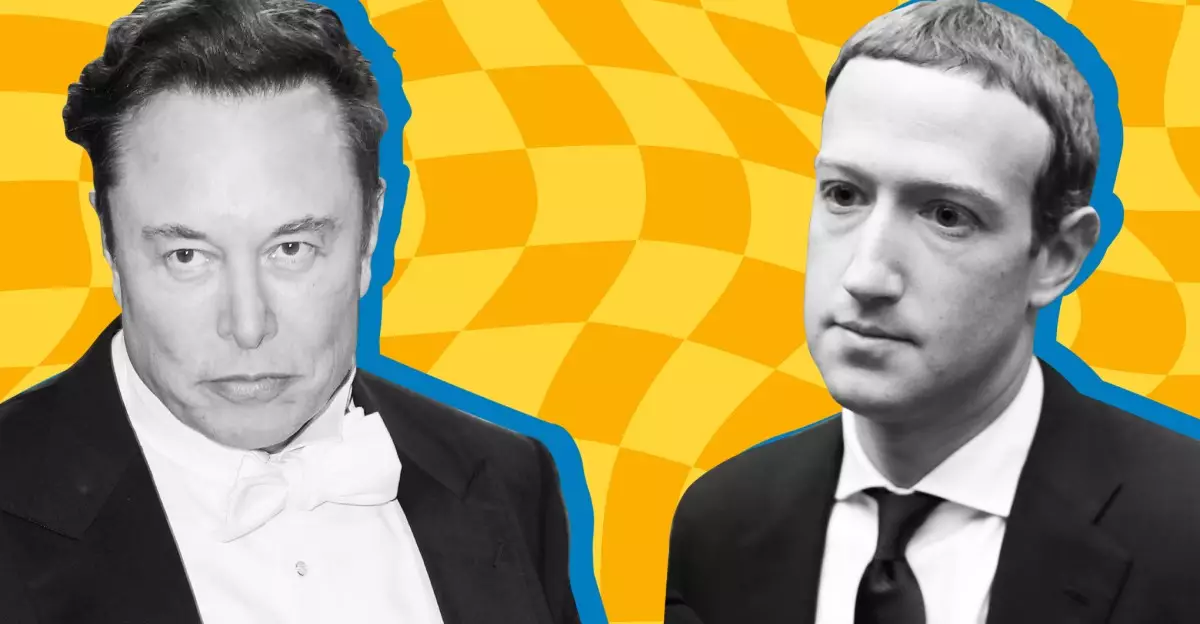In an ironic twist blending technology, social commentary, and audacious humor, recent incidents across several California cities have spotlighted the darkly comedic potential of artificial intelligence. The voices of two of the tech industry’s most polarizing figures—Elon Musk and Mark Zuckerberg—have seemingly been cloned to mock these billionaires, interrupting the quiet functionality of pedestrian crosswalks. As the world watches tech giants influencing our lives, this peculiar intersection of technology and public reaction invites us to consider how innovation can just as easily serve as a source of amusement as it does a tool for social connectivity.
Set against the backdrop of Palo Alto, Redwood City, and Menlo Park, these hacked crosswalk buttons launched a wave of laughter, intrigue, and concern. The audacious prank took on a unique form: what could initially be perceived as a harmless joke quickly spiraled into a point of contention regarding the implications of such technology when uninhibited—and perhaps unchecked. Some have meandered into contemplating the broader ramifications of artificial intelligence, not just in terms of its utility, but also in how it may inadvertently offer a societal critique.
The Hilarity of Soul-Crushing Commentary
It’s not just a prank; it’s a performance art piece that leaves observers questioning the absurdity of modern existence. The simulated voices deliver outlandish, satirical content that mirrors some of the stark realities of technological advancements and the cultural critiques surrounding them. In a world where Elon Musk is heralded as a visionary yet scrutinized for his eccentricities, messages such as “Can we be friends? I’ll give you a Cybertruck!” resonate with the absurdity of celebrity culture entwined with the pursuit of validation in the social media age.
Zuckerberg’s parodic voice takes the satire a step further, spouting lines that mock corporate dominance, and bringing into focus some of the more sinister undertones associated with the tech giant: “from undermining democracy to cooking our grandparents’ brains with AI slop.” With this remark, the AI-dupe resonates with those who feel disenfranchised by the maze of algorithms and corporate agendas that govern our digital experience.
The juxtaposition of humor and harsh truth in these messages encourages a deeper reflection on the moral responsibilities of those creating these technologies. Should inventors and CEOs be held accountable for the consequences of their creations? As consumers, how are we impacted by the relentless construction of digital platforms that prioritize engagement over ethical considerations?
The Response and Ramifications
In a hilariously ironic twist, workers from local government offices rushed to disable the malfunctioning crosswalks in response to the mischief. While these tech-inspired jokes injected levity into an otherwise mundane midday downtown stroll, they also raised serious questions about hacker security, voice synthesis technology, and public vulnerability. The city spokesperson emphasized that this quirk was a nuisance rather than a direct safety threat; evidently, the audible pranks did not disrupt the functional safety features of the crosswalks. Still, one can’t help but wonder if this is merely the tip of the iceberg in a future where AI-generated voices could very easily create dysfunction in more serious real-life situations.
Moreover, this instance forces us to consider the consequences of where society is heading with AI-generated communication. If we can manipulate voices to deliver ludicrous narratives in public settings, what might preclude us from weaponizing such technology for malicious purposes? The fine line between humor and harm becomes increasingly blurred in an age where swift technological progress often outpaces sociopolitical discourse.
The Broader Conversation: AI in the Hands of the Public
As we navigate this intriguing digital landscape, a vital conversation emerges about the intersection of art, technology, and everyday life. Technologies like these voice synthesizers are entertaining tools of dystopian humor that can galvanize society towards greater scrutiny of the systems and individuals in power.
Musk and Zuckerberg, once untouchable icons of the tech world, suddenly find themselves at the mercy of a prankster collective wielding AI in the pedestrian field. This serves as a stark reminder that no one, no matter their position, is immune from ridicule in the era of social media and relentless content creation.
In this chaotic age where technology dances precariously between innovation and absurdity, perhaps these AI-generated voices can be viewed not merely as a light-hearted prank but as a clarion call for a more engaged and critical public. As we grapple with the rapid evolution of technology and its societal implications, there’s powerful liberation in laughter, and even more power in confronting the uncomfortable truths embedded within that laughter.

